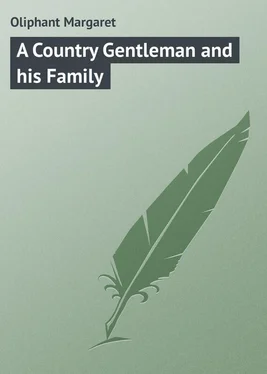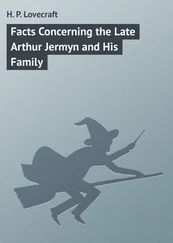Margaret Oliphant - A Country Gentleman and his Family
Здесь есть возможность читать онлайн «Margaret Oliphant - A Country Gentleman and his Family» — ознакомительный отрывок электронной книги совершенно бесплатно, а после прочтения отрывка купить полную версию. В некоторых случаях можно слушать аудио, скачать через торрент в формате fb2 и присутствует краткое содержание. Жанр: foreign_prose, на английском языке. Описание произведения, (предисловие) а так же отзывы посетителей доступны на портале библиотеки ЛибКат.
- Название:A Country Gentleman and his Family
- Автор:
- Жанр:
- Год:неизвестен
- ISBN:нет данных
- Рейтинг книги:5 / 5. Голосов: 1
-
Избранное:Добавить в избранное
- Отзывы:
-
Ваша оценка:
- 100
- 1
- 2
- 3
- 4
- 5
A Country Gentleman and his Family: краткое содержание, описание и аннотация
Предлагаем к чтению аннотацию, описание, краткое содержание или предисловие (зависит от того, что написал сам автор книги «A Country Gentleman and his Family»). Если вы не нашли необходимую информацию о книге — напишите в комментариях, мы постараемся отыскать её.
A Country Gentleman and his Family — читать онлайн ознакомительный отрывок
Ниже представлен текст книги, разбитый по страницам. Система сохранения места последней прочитанной страницы, позволяет с удобством читать онлайн бесплатно книгу «A Country Gentleman and his Family», без необходимости каждый раз заново искать на чём Вы остановились. Поставьте закладку, и сможете в любой момент перейти на страницу, на которой закончили чтение.
Интервал:
Закладка:
"We are authorised to put it in perfect repair, and you are authorised to choose whatever you please out of the furniture at the Warren to make it according to your taste. Perhaps we had better do that at once, and put it into your hands. If you don't live there, you can let it, or lend it, or make some use of it."
"It might be convenient," Mrs. Warrender said, with a slight hesitation, "if Theodore means, as I suppose he does, to carry out improvements here."
And yet she had implored him yesterday not to make many alterations! Theo felt a touch of offence with his mother. He began to think there was something in the things the girls used to say, that you never knew when you had mamma, or whether she might not turn upon you in a moment. She grew much more energetic, all at once, and even her figure lost the slight stoop of languor that was in it. "If you are going to cut any trees, or do any drainage, Theo, we could all live there while the works went on."
He gave a slight start in person, and a much greater in spirit, and a fastidious curve came to his forehead. "I don't know that I shall cut any trees now. You know you said the other day, We can talk of that after."
"Oh yes, it is early days," said the lawyer. "Of course it is not as if there were other heirs coming in, or any compulsory division were to be made. You can take your time. But I have always observed that things went smoother when it was understood from the first, in case of a certain emergency arising, or new conditions of any kind, so and so should follow. You understand what I mean."
"It is always wisest," said the Warrender cousin, "to have it all put down hard and fast, so that nobody may be disappointed, whatever should happen. Of course Theo will marry."
"I hope so," said his mother, permitting herself to smile.
"Of course he will marry," said the lawyer.
"But he had better take his degree first," the cousin added, feeling that he had distinguished himself; "and in the meantime the girls and you will have time to look about you. Highcombe is rather a dull place. And then the house is large. You could not get on in it with less than four or five servants."
"Four would do," said Mr. Longstaffe.
"And supposing my cousin kept a pony chaise, or something? She could not get on without a pony chaise. That means another."
Theodore pushed back his chair from the table with a harsh peremptoriness, startling them all. "I am sure my mother doesn't want to go into these calculations," he said; "neither do I. Leave us alone to settle what we find to be best."
"Dear me," said cousin Warrender, "I hope you don't imagine me to have any wish to interfere." Theo did not make any reply, but gave his mother his arm, and led her upstairs.
"I did not wish you to be troubled with business at all; certainly not to-day," he said to her, half apologetically. But there was something in her face which he did not quite understand, as she thanked him and smiled, with an inclination to cry. Was it possible that she was a little disappointed to have the discussion stopped, and that she took much interest in it, and contemplated not at all with displeasure the prospect of an entire change in her life?
CHAPTER IV
It will be divined from what has been said that there was one element in the life at the Warren which has not yet been entered into, and that was Mrs. Warrender. The family were dull, respectable, and proper to their fingers' ends. But she was not dull. She had been Mr. Warrender's wife for six-and-twenty years, – the wife of a dull, good man, who never wanted any variety in his life, who needed no change, no outbursts of laughter or tears, nothing to carry away the superabundance of the waters of life. With him there had been no superabundance, there had never been any floods; consequently there was no outlet necessary to carry them away. But she was a woman of another sort: she was born to hunger for variety, to want change, to desire everything that was sweet and pleasant. And lo! fate bound her to the dullest life, – to marry Mr. Warrender, to live in the Warren. She had not felt it so much in the earlier part of her life, for then she had to some extent what her spirit craved. She had children: and every such event in a woman's life is like what going into battle is to a man, – a thing for which all his spirits collect themselves, which she may come out of or may not, an enormous risk, a great crisis. And when the children were young, before they had as yet betrayed themselves what manner of spirits they were, she had her share of the laughter and the tears; playing with her babies, living for them, singing to them, filling her life with them, and expecting as they grew up that all would be well. Many women live upon this hope. They have not had the completion of life in marriage which some have; they have failed in the great lottery, either by their own fault or the fault of others: but the children, they say to themselves, will make all right. The désillusionment which takes this form is the most bitter of all. The woman who has not found in her husband that dearest friend, whose companionship can alone make life happy, when she discovers after a while that the children in whom she has placed her last hope are his children, and not hers, – what is to become of her? She is thrown back upon her own individuality with a shock which is often more than flesh and blood can bear. In Mrs. Warrender's case this was not, as in some cases, a tragical discovery, but it had an exasperating and oppressive character which was almost more terrible. She had been able to breathe while they were children; but when they grew up they stifled her, each with the same "host of petty maxims" which had darkened the still air from her husband's lips. How, in face of the fact that she had been their teacher and guide far more than their father ever was, they should have learned these, and put aside everything that was like her or expressed her sentiments, was a mystery which she never could solve; but so it was. Mr. Warrender was what is called a very good father. He did not spoil them; bonbons of any kind, physical or spiritual, never came to them from his hands. He could not be troubled with them much as babies, but when they grew old enough to walk and ride with him he liked their company; and they resembled him, which is always flattering. But he had taken very little notice of them during the first twelve years or so of their life. During that time they had been entirely in their mother's hands, hearing her opinions, regulated outwardly by her will: and yet they grew up their father's children, and not hers! How strange it was, with a touch of the comic which made her laugh! – that laugh of exasperation and impatience which marks the intolerable almost more than tears do. How was it? Can any one explain this mystery? She was of a much more vivacious, robust, and vigorous race than he was, for the level of health among the Warrenders, like the level of being generally, was low; but this lively, warm-blooded, energetic creature was swallowed up in the dull current of the family life, and did not affect it at all. She nursed them, ruled them, breathed her life into them, in vain: they were their father's children, – they were Warrenders born.
This was not precisely the case with Theo, her only son. To him she had transmitted something; not her energy and love of life, but rather something of that exasperated impatience which was so often the temper of her mind in later years, though suppressed by all the powers of self-control she possessed, and modified, happily, by the versatility of her nature, which could not brood and mope over one subject, however deeply that might enter into her life. This impatience took in him the form of a fastidious intolerance, a disposition to start aside at a touch, to put up with nothing, to hear no reason even, when he was offended or crossed. He was like a restive horse, whom the mere movement of a shadow, much more the touch of a rein or the faintest vibration of a whip, sets off in the wildest gallop of nervous self-will or self-assertion. The horse, it is to be supposed, desires his own way as much as the man does when he bolts or starts. Theo was in this respect wonderfully unlike the strain of the Warrenders, but he was not on that account more like his mother; and he had so much of the calm of the paternal blood in his veins along with this unmanageableness that he was as contented as the rest with the quiet of the home life, and so long as he was permitted to shut himself up with his book wished for no distraction, – nay, disliked it, and thought society and amusements an intolerable bore.
Читать дальшеИнтервал:
Закладка:
Похожие книги на «A Country Gentleman and his Family»
Представляем Вашему вниманию похожие книги на «A Country Gentleman and his Family» списком для выбора. Мы отобрали схожую по названию и смыслу литературу в надежде предоставить читателям больше вариантов отыскать новые, интересные, ещё непрочитанные произведения.
Обсуждение, отзывы о книге «A Country Gentleman and his Family» и просто собственные мнения читателей. Оставьте ваши комментарии, напишите, что Вы думаете о произведении, его смысле или главных героях. Укажите что конкретно понравилось, а что нет, и почему Вы так считаете.












